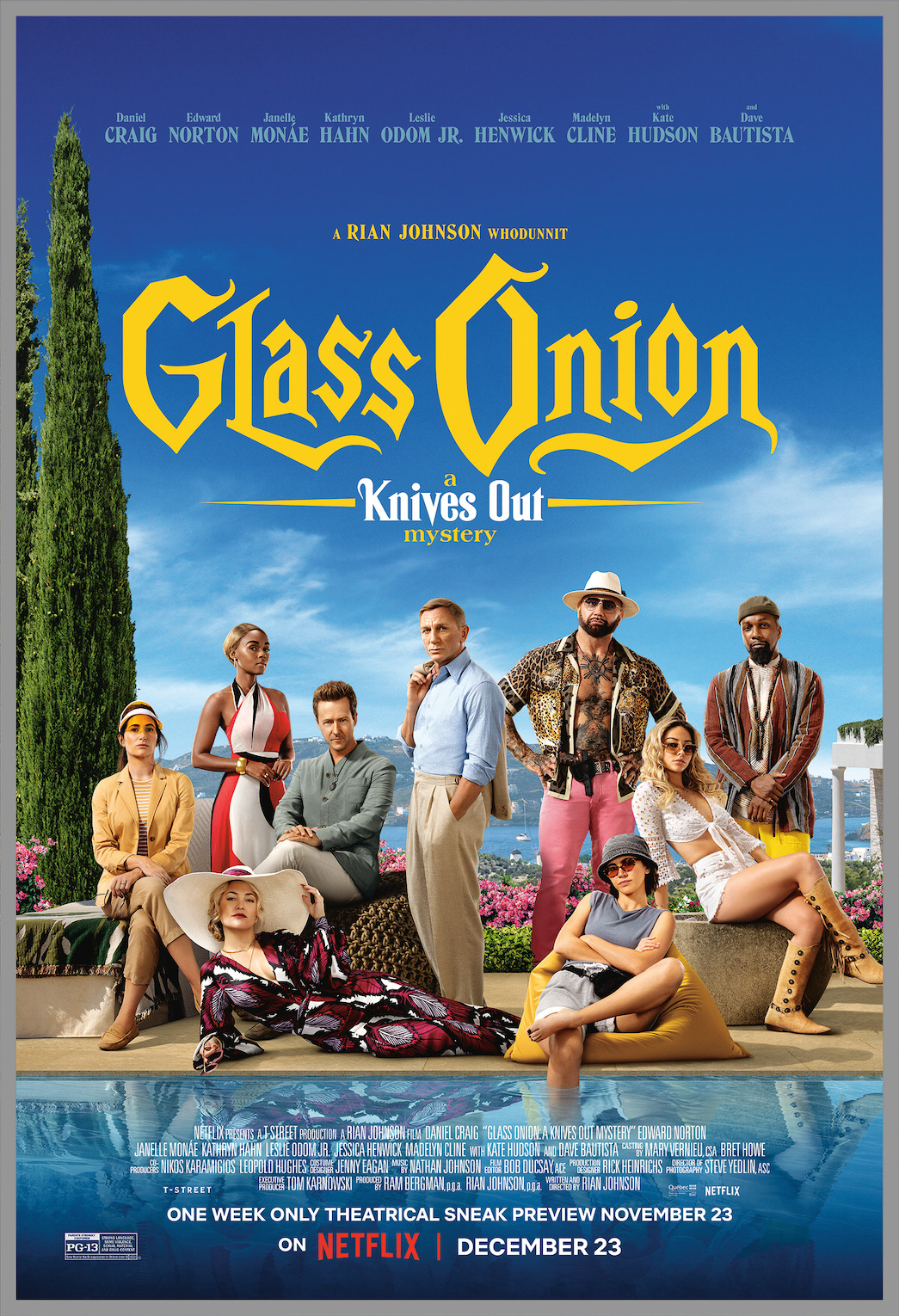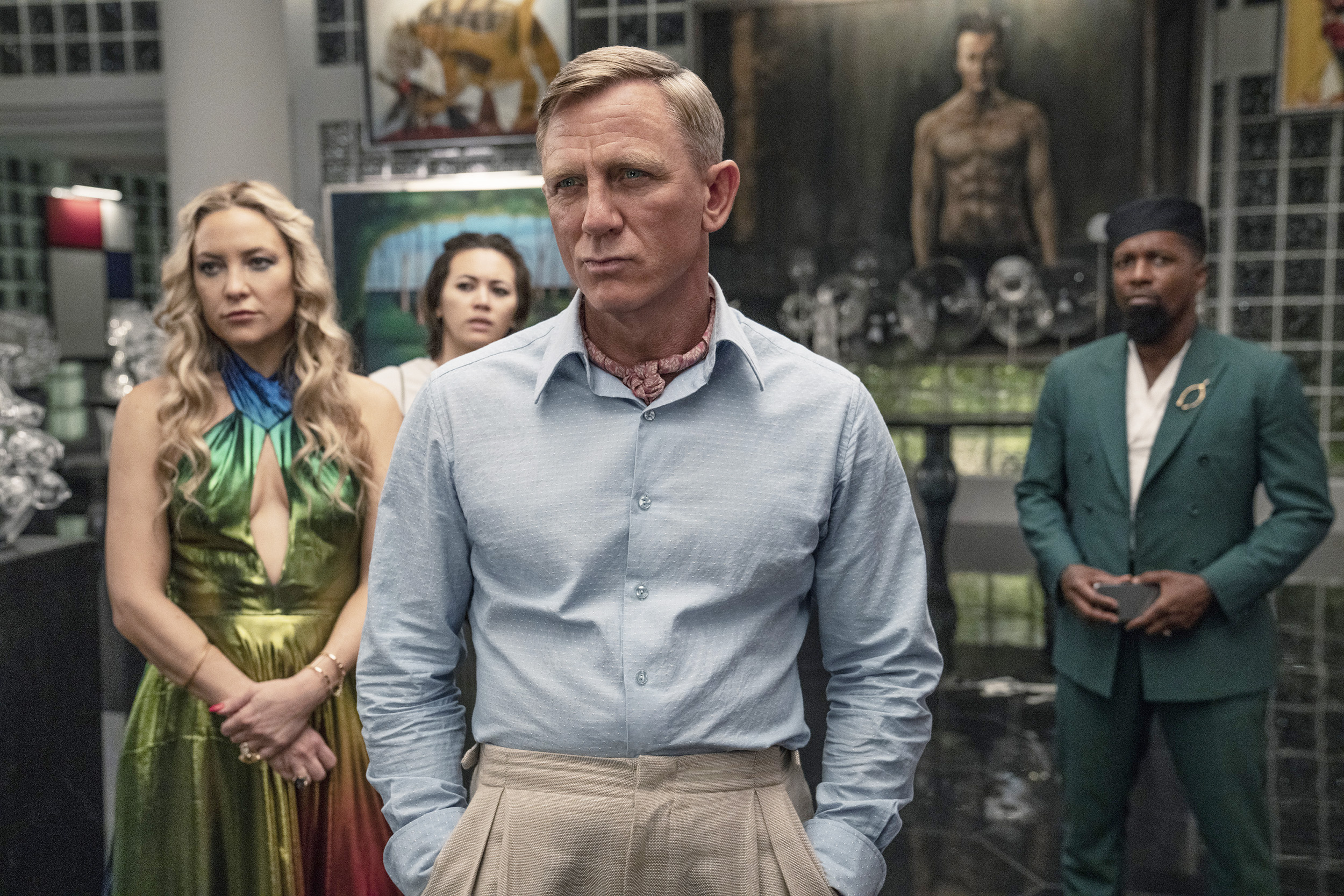
c/o Netflix
This article does not contain spoilers for the major developments of “Glass Onion: A Knives Out Mystery” but does contain plot information some may consider spoilers.
“Knives Out,” the 2019 murder mystery film written and directed by Rian Johnson, was one of the bigger surprises to come out of Hollywood lately. It was an original film, based on nothing but Johnson’s love of whodunits, that nonetheless managed to become a box office smash through sheer entertainment value alone in an era dominated by franchises. Of course, such success meant that “Knives Out” would become a franchise itself. Netflix cut a nine-figure deal with Johnson for the rights to two “Knives Out” sequels after the success of the original. The first such sequel, “Glass Onion: A Knives Out Mystery,” will be streaming on Dec. 23 following a one-week theatrical run that ended last week. Though it will be seen at home by most, “Glass Onion” is no less of a blockbuster-scale crowd-pleaser than its predecessor, delivering a sharp, satirical narrative wrapped around a wonderfully twisted mystery.
Reviews in The Argus tend to contain substantial spoilers for the movies they discuss. However, due to the central nature of mystery to the appeal of “Glass Onion,” this article will steer clear of unwrapping the film’s major twists and turns, and instead will aim to describe its basic premise with the hope of intriguing potential viewers ahead of the film’s Netflix release later this month. Nonetheless, if you intend to go into “Glass Onion” with no knowledge of the film whatsoever, turn back now.
Though “Glass Onion” is a sequel to “Knives Out,” it tells a standalone mystery, with Benoit Blanc, the central Southern sleuth played by Daniel Craig, as the only returning character, investigating a wholly new set of players in the proud tradition of Sherlock Holmes and Hercule Poirot. The mystery is set in the recent past, May 2020, the peak of COVID-19 lockdowns, as Miles Bron (Edward Norton), the eccentric billionaire behind fictional tech giant Alpha, invites a group of friends to escape quarantine for a weekend at his estate on a private Greek island.
This motley crew of elites includes conniving Connecticut governor Claire Debella (Kathryn Hahn), high-strung Alpha chief scientist Lionel Toussaint (Leslie Odom Jr.), perpetual foot-in-mouth fashion designer Birdie Jay (Kate Hudson), Joe Rogan-esque Twitch streamer Duke Cody (Dave Bautista), and Miles’ aloof former business partner Cassandra “Andi” Brand (Janelle Monáe). Two plus-ones, Duke’s much-younger girlfriend, Whiskey (Madelyn Cline), and Birdie’s harried personal assistant, Peg (Jessica Henwick), round out the film’s ensemble. Tensions are initially piqued over why Andi, who recently departed from Alpha amid massive public acrimony, was on the guest list. What’s more, Miles is perplexed as to who invited Blanc, a real-life detective, to this murder mystery-themed weekend getaway—he certainly didn’t.
To go further, even to explain what mystery prompted Blanc’s visit, is to get into the territory of spoilers best discovered in one’s own viewing of the film. Needless to say, anyone who found the mix of comedy, suspense, and sharp social commentary in the first “Knives Out” appealing will be more than satisfied with “Glass Onion.” Johnson proves true mastery over mystery as innocuous details come back to prove massively important, and, much like the metaphorical sculptural vegetable referenced in its title, it turns out that the film’s many layers were all in plain sight if we looked in the right places.

c/o Netflix
Johnson also continues to innovate with structure, subverting what viewers expect from the pacing of a mystery film. In the original “Knives Out,” we see “whodunit” in the film’s first minutes. In “Glass Onion” we don’t even learn what, exactly, Blanc is investigating until a series of unexpected developments midway through the film’s runtime recontextualize everything we’ve seen thus far. At this point, the breezy screenplay shifts into overdrive, taking viewers on a joy ride as Blanc attempts to crack the case.
As with its predecessor, much of the fun of “Glass Onion” stems from its impeccable ensemble. Craig is as droll as ever as Blanc, chewing scenery and spinning pseudo-folksy aphorisms as he peels apart everyone’s ill intentions. Norton’s performance as Miles, a billionaire who fashions himself as a “disruptor” genius while actually possessing an exceptionally dull wit, feels particularly topical given the last month of news from Elon Musk’s acquisition of Twitter. Bautista’s portrayal of Duke’s caustic machismo is a frequent source of comic relief. While initially enigmatic in her quietness, Monáe gives a richly layered performance, with Andi’s troubled relationship with Miles proving central to the mystery.
Johnson also manages to weave acidic social commentary into the film’s white-knuckle thrills. Whereas the original film was a send-up of New England old money, “Glass Onion” sees Blanc unraveling the moral turpitude of Silicon Valley new money, revealing the emptiness and cynicism of those who claim to be aiming to change the world while actually only serving their own egos and self-interest. Yet Johnson deftly manages to convey this message without ever coming off as heavy-handed or moralizing. After all, plenty of classic mystery stories satirize the aristocracy of their era, so it only seems fair to give today’s uber-rich the same treatment.
“Glass Onion” is not a perfect film. While still highly engaging, it lacks the narrative precision of its predecessor, instead seeming to somewhat rush and drag at times. A few minor elements end up unresolved. The visuals of the film, while attempting to channel a sunny Mediterranean feeling in contrast to the first’s autumnal New England look, occasionally look cheap in spite of its luxurious setting, though Johnson and cinematographer Steve Yedlin do put together an array of impressive compositions.
Nonetheless, these are minor gripes for what is, as a whole, a massively entertaining piece of filmmaking, the singular vision of one of the most original writer-directors working at this scale in Hollywood today. For those who crave mystery, there’s a hell of a good time to be had unpeeling the layers of “Glass Onion.”
Oscar Kim Bauman can be reached at obauman@wesleyan.edu.
Comments are closed